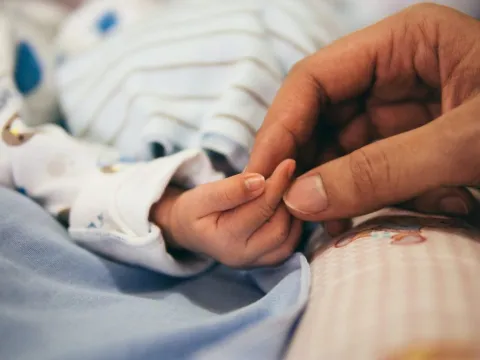New survey aims to improve care for families grieving loss of baby

A new University of British Columbia survey looks to improve future care for Canadian families coping with stillbirth and neonatal loss.
The online questionnaire is open to people over 18 in Canada who have experienced perinatal loss between Jan. 30, 2018, and Dec. 30, 2021. The findings will contribute to an international study led by researchers in Australia.
Dr. Wendy Hall, a professor at UBC’s school of nursing, is conducting the study with English-speaking parents in Canada, along with professor Francine de Montigny, of Université du Québec, who is leading a Francophone version of the same study.
Dr. Hall shares how this research could make a difference to families in Canada and around the globe.
What is perinatal loss and why is it important to study it?
We don’t always understand what causes stillbirths and neonatal deaths. There are many complex factors, but regardless of the causes, the results are tragic. Families who lose a baby, either after 20 weeks of pregnancy or during the first 28 days of the postnatal period, suffer incredible trauma. Their loss has huge implications for the well-being of the couple, for any siblings that were born before the loss, and for any children born after the loss.
What are you hoping to find out?
There is very little information available about how families perceive the care they receive after a stillbirth or neonatal death and about the impact of perinatal loss on parents’ mental health. People tend to regard childbirth as a happy time when everybody’s dancing around and drinking champagne. There is often silence about situations when it’s not a happy event, and the negative mental health outcomes for parents. Health care providers do not know very much about the experience of perinatal loss from Canadian parents’ perspectives.
We want to find out what families are going through. We’re asking questions about their perceptions of the care they have received after their losses, as well as their mental health, their sleep, and feelings of anger. We want to find out if they are satisfied with the care and supports they have received from health care providers, religious or spiritual advisors, counsellors, funeral directors, friends and family, and peer support groups.
You are asking about their experiences, both pre-COVID and during. Why is the pandemic significant?
The global study is looking at all care for childbearing parents during the COVID pandemic. Our team wanted to focus on perinatal loss. Because of the traumatic nature of perinatal loss, we think it is important to have a baseline describing care parents received prior to COVID, as well as their care during the pandemic, so that we can understand how reductions in face-to-face health care visits, restrictions around visitors and access to hospital facilities, and things like personal protective equipment affected families’ care.
What would you like to see come about as a result of this study?
We’re hoping our results can inform policy about a national standard for care to support Canadian families who have suffered a perinatal loss.
There was a small Ontario survey on this subject which found that parents indicated that they were not adequately informed, supported and cared for by healthcare professionals. They also experienced stigma from care providers, thereby worsening an already difficult time.
If we’re not giving families the support they need, or listening to what their concerns are, then we’re adding to the injuries they suffered from the loss. We’re not helping them work through the grief and the loss that they’ve experienced.
Can you give examples of what improved supports could look like?
Improved supports could mean providing adequate time for parents to be with their babies after they have died, involving parents in decisions about investigations, procedures and other tests after their loss, and providing opportunities for parents to create memories of their babies. Supports can also mean offering parents follow-up support through phone calls or visits, attending to the significant mental health effects of parents’ loss, and providing information about organizations to contact for bereavement support.
To learn more or to participate in the survey, visit COCOON Study Survey.
This article originally appeared on UBC News.


